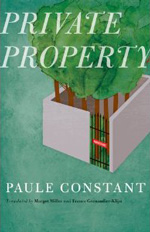

Bison Books, paperback, 9780803234802
Tiffany Murano is an outsider. Her parents, French expats in Africa, have sent her to an all-girls boarding school in France. The Catholic boarding school, the Convent of the Slaughterhouse Ladies, is a place devoid of love; Tiffany does not fit in with the other girls, and the nuns shun her pleas for affection. She misses her home, a place of beauty and natural wonders, where life was less rigid.
Finally, a glimmer of hope appears in Tiffany's life: her grandparents. They begin to invite her to their Thursday bridge games, and this miniscule amount of attention is all it takes to win Tiffany's love. Eventually, the grandparents purchase a farm in the French countryside, and offer Tiffany a place to spend her holidays. Their affection for their granddaughter grows, and Tiffany begins to lead two lives – that of an outcast at school, and of a cherished child at her grandparents.
Paule Constant contrasts the world of the farm with that of the convent. At school, everything is suffocating and rigid, and life takes place primarily indoors. In the countryside, Tiffany spends her days outside reveling in the beauty around her, free to do as she pleases. Her grandmother is loving and warm, while the nuns are manipulative and cold. This contrast is so defined that the reader instinctively knows that tragedy is on its way. With holidays the only things that make school bearable, of course Tiffany's one form of solace must come to an end. Her grandmother's health worsens, and Tiffany worries that she will lose the person to whom she is closest.
Unfortunately, this story of an outsider struggling to find peace gets lost in Constant's excessive description. Entire pages dwell on miniscule events such as Tiffany running her fingers along the walls of her school, and the struggle between being polite and being pushy when finding a seat on the bus. As well, Tiffany reveres nature with a saccharine attitude worthy of Romantic poets. I have little patience for this Wordsworthian approach, particularly in a short novel that struggles to develop its major characters. Rather than focusing on setting, Constant would have been better served to make Tiffany a more sympathetic character. Who easier to pity than a child rejected by her peers and adults alike, especially one whose parents have sent her away? Yet despite Tiffany's plight, I never connected with her. In the end, like the nuns, I ignored her sorrows.
Certainly many readers will find a great deal to enjoy in Private Property. Constant writes intellectual,
complex prose, and this translation keeps that alive. Lovers of the connection between characters and nature
will understand Tiffany far more than I did, and those who experienced their own troubles fitting in as children
may very well find a novel that speaks to their own lives.
